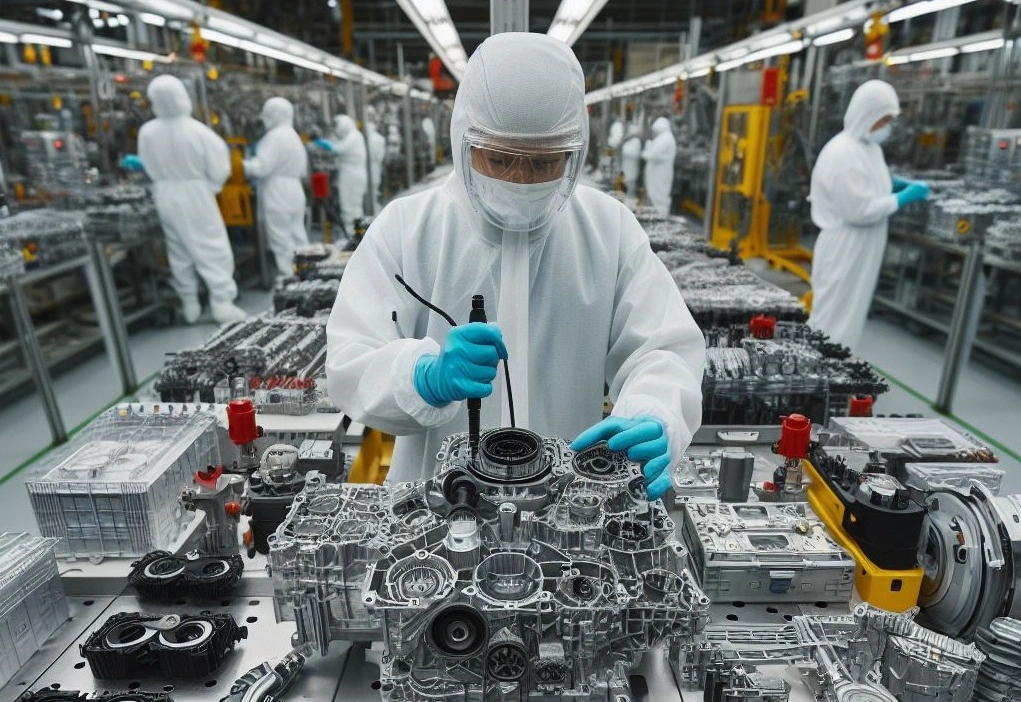Introduction to the Auto Parts Industry
The global automotive industry is a major player in the world economy, known for its extensive revenues and escalating consumer demand. It includes a wide range of companies involved in manufacturing cars, buses, trucks, motorcycles, and other vehicles, as well as those dealing in vehicle parts distribution. High barriers to entry, such as the need for specific machinery, skilled labor, and technology, characterize this sector.
The industry is significant for its manufacturing processes—spanning from design to servicing of vehicles—and is one of the largest in global manufacturing. Innovation, driven by technological advancements and cost-effective labor, is a key feature, although the industry also grapples with challenges like competition, environmental concerns, and high R&D costs.
Presently, the auto parts industry is undergoing remarkable growth due to increasing consumer demand and technological progress. Expected to reach impressive figures by 2030, the market is expanding rapidly. This growth is fueled by the demand for innovative and sustainable products, combined with technological integration. The auto parts manufacturing market is forecasted to hit USD 1284.99 billion by 2033, growing at a 6.47% CAGR. Similarly, the automotive aftermarket is also set to grow, thanks to advanced production technologies and digitalization in maintenance services.
Key companies in this sector are integral, focusing on the production of original equipment manufacturing (OEM) components and aftermarket services. They are continuously investing in R&D to bring forth products that are better performing, durable, and sustainable. Expansion in distribution networks and partnerships with OEMs is also a focus, helping these companies increase their global footprint. The industry’s growth is being propelled by technological advancements, consumer demand, and the adoption of new manufacturing technologies like automation and 3D printing.
Top Automotive Parts Manufacturing Companies in the World
- AISIN CORPORATION
| Established: | 1943 |
| Headquarter | Kariya, Japan |
| Website: | https://www.aisin.com/en/ |
Aisin Corporation, established in 1943 by Kiichiro Toyoda as the Tokai Aircraft Company and headquartered in Kariya, Japan, initially produced engine parts for World War II aircraft before evolving into a leading international automotive manufacturer and supplier of advanced automotive components, such as engine parts, driving systems, suspensions, and clutches. Dominating its revenue stream, automotive components contribute nearly 95%, while the remaining comes from creative lifestyle, energy, and environmental products. Aisin’s diversification strategy also encompasses die-cast parts, home appliances, and knitting and sewing machine production. The company, with over 100 subsidiaries across the Americas, Europe, Asia, and Oceania, offers a broad range of products, including automotive components and lifestyle items like furniture, fabrics, medical instruments, and innovative air conditioners. Aisin’s commitment to innovation and global expansion has solidified its position as a major player in the automotive industry, continually strengthening its auto parts segment and exploring new markets, highlighting its dedication to industry leadership and diversification.
- Autoliv Inc.
| Established: | 1997 |
| Headquarter | Stockholm, Sweden |
| Website: | https://www.aisin.com/en/ |
Autoliv, Inc., based in Stockholm, Sweden, emerged as a global leader in automotive safety systems following its founding in 1997 from the merger of Autoliv AB and Morton ASP. The company specializes in developing, manufacturing, and marketing a wide array of automotive safety products, including airbags, seatbelts, steering wheels, passive safety electronics, and active safety systems like radar, night vision, and camera vision systems. Notably, Autoliv also produces anti-whiplash systems, pedestrian protection systems, and integrated child seats, making it the world’s largest producer of automotive safety equipment. The company’s commitment to innovation and safety has led to many technological firsts, especially in seatbelt and airbag technologies, maintaining its leadership in automotive safety for over 70 years. Autoliv’s focus on safety R&D and its status as a market leader have made it a preferred safety specialist for car manufacturers globally. With a significant worldwide presence and a strong emphasis on technological advancements, Autoliv continues to be a key influencer in the evolution of automotive safety.
- BASF SE
| Established: | 1865 |
| Headquarter | Ludwigshafen, Germany |
| Website: | https://www.basf.com/in/en.html |
BASF SE, with its headquarters in Ludwigshafen, Germany, traces its origins to 1865 when Friedrich Engelhorn founded it as the Badische Anilin- & Sodafabrik (BASF). Initially focusing on dyes and inorganic chemicals, BASF has grown into the world’s leading chemical company, offering an extensive range of products and solutions across various industries. The company’s major offerings include chemicals, plastics, performance chemicals, catalysts, coatings, crop technology, and activities in crude oil and natural gas exploration and production. BASF operates in several market segments, namely Chemicals, Plastics, Performance Products, Functional Solutions, Agricultural Solutions, and Oil and Gas. With a presence in over 80 countries and a customer base in more than 190 countries, BASF plays a significant role in the global market, supplying products to a diverse range of industries. Despite its size and global reach, BASF continues to be a pivotal player in the chemical industry, prioritizing innovation, sustainability, and maintaining a diverse portfolio of products and solutions.
- BorgWarner, Inc.
| Established: | 1928 |
| Headquarter | Auburn Hills, Michigan |
| Website: | https://www.borgwarner.com/home |
BorgWarner, Inc., an American automotive and e-mobility supplier, is headquartered in Auburn Hills, Michigan, and was established in 1928 from the merger of various manufacturers including Morse Equalizing Spring Company, Borg & Beck, Marvel-Schebler, Warner Gear, and Mechanics Universal Joint. As one of the top 25 largest automotive suppliers globally, BorgWarner operates 92 facilities in 24 countries, generates revenues of US$15.8 billion, and employs about 52,000 people. The company functions in two main segments: Air Management and E-Propulsion & Drivetrain, serving as an original equipment supplier to numerous major automotive OEMs. Its wide product range includes turbochargers, timing devices, chain systems, wet clutches, hydraulic modules, and engine and drivetrain systems. Committed to an electrification strategy, BorgWarner aims to increase its revenue from electric vehicles and achieve carbon neutrality by 2035. The company has bolstered its EV portfolio through recent acquisitions of AKASOL, Santroll, Rhombus, DriveTek, and Hubei Surpass Sun Electric, positioning itself as a leader in EV propulsion.
- ThyssenKrupp AG
| Established: | 1999 |
| Headquarter | Duisburg and Essen, Germany |
| Website: | https://www.thyssenkrupp.com/en/home |
ThyssenKrupp AG, a German multinational conglomerate, operates its headquarters in Duisburg and Essen, Germany, and was established in 1999 from the merger of Thyssen AG and Krupp, two historic German steel companies from the 19th century. As a leading global supplier, ThyssenKrupp offers steel, stainless products, automotive technologies, plant technologies, elevator systems, escalators, marine systems, shipbuilding, and firearms. The company’s operations are divided into six segments: Steel Europe, Steel Americas, Materials Services, Elevator Technology, Industrial Solutions, and Components Technology. Committed to sustainability, ThyssenKrupp has launched a green tech division dedicated to developing sustainable technologies and solutions. With a workforce of over 100,000 employees and subsidiaries in more than 80 countries, ThyssenKrupp’s diverse product and service portfolio, coupled with its focus on innovation and sustainability, cements its status as a significant player in the global market.
- Continental AG
| Established: | 1871 |
| Headquarter | Hanover, Germany |
| Website: | https://www.continental.com/en/ |
Continental AG, a German multinational company, was founded in 1871 as Continental-Caoutchouc und Gutta-Percha Compagnie, a rubber manufacturer, in Hanover, Germany. It has since transformed into a leading technology company, offering a diverse range of products and solutions across various industries. Continental AG is structured into six segments: Steel Europe, Steel Americas, Materials Services, Elevator Technology, Industrial Solutions, and Components Technology. The company’s product and service offerings include chemicals, plastics, performance chemicals, catalysts, coatings, crop technology, as well as crude oil and natural gas exploration and production. Additionally, Continental AG is a prominent supplier of automotive components, including tires, brake systems, and electronic systems. With a workforce of over 100,000 employees and subsidiaries in more than 80 countries, the company’s commitment to sustainability is evident in its green tech division, focusing on developing sustainable technologies and solutions. Continental AG’s diverse product portfolio, combined with its dedication to innovation and sustainability, establishes its role as a significant player in the global market.
- DENSO CORPORATION
| Established: | 1949 |
| Headquarter | Kariya, Aichi Prefecture, Japan |
| Website: | https://www.denso.com/global/en/ |
Denso Corporation, a global automotive components manufacturer, is headquartered in Kariya, Aichi Prefecture, Japan, and was founded in 1949 as Nippon Denso Co. Ltd. after separating from Toyota Motor. As part of the Toyota Group, Toyota owns about 25% of Denso, yet sales to the Toyota Group constitute less than 50% of its total revenue as of the year ending March 2016. Denso specializes in developing and manufacturing a wide range of auto parts, such as gasoline and diesel engine components, hybrid vehicle components, climate control systems, instrument clusters, airbag systems, pre-crash radar systems, and spark plugs. The company also ventures into non-automotive components, including household heating equipment and industrial robots. Denso, as a leading supplier of automotive components, is dedicated to innovation and sustainability, focusing on developing sustainable technologies and solutions. With subsidiaries in more than 80 countries, Denso maintains a significant global presence and stands as a key player in the global market.
- Faurecia
| Established: | 1998 |
| Headquarter | Nanterre, Paris |
| Website: | https://www.faurecia.com/en |
Faurecia, now operating as FORVIA, is a French global automotive supplier headquartered in Nanterre, near Paris. The company originated in 1998 from the merger of two notable French automotive component suppliers, Bertrand Faure and ECIA, which was the components unit of PSA Peugeot-Citroen. As a top ten global automotive supplier, Faurecia has a presence in 35 countries, with over 300 production sites and 35 R&D centers across 37 countries. The company is a leading provider of automotive seating, interiors, and emissions control technologies, focusing on six core product lines: car seats, cockpits, exhaust systems, acoustic packages, doors, and front ends. Faurecia serves major automotive manufacturers, including Volkswagen Group, Stellantis, Renault–Nissan–Mitsubishi, Ford, General Motors, BMW, Daimler, Toyota, Tesla, Inc., Hyundai-Kia, Jaguar Land Rover, and BYD. Committed to developing technologies for safe, sustainable, advanced, and customized mobility, Faurecia aligns its operations with its mission across four Business Groups: Seating, Interiors, Clean Mobility, and Electronics. As part of the Group FORVIA, together with HELLA, Faurecia is dedicated to being a change maker, actively participating in and shaping the transformation of mobility.
- Valeo
| Established: | 1923 |
| Headquarter | Paris, France |
| Website: | https://www.valeo.com/en/ |
Valeo, a French global automotive supplier headquartered in Paris, France, traces its origins to 1923 when it was founded as Société Anonyme Française de Ferodo in Saint-Ouen, near Paris. Listed on the Paris Stock Exchange, Valeo is a key supplier of automotive components, including car seats, cockpits, exhaust systems, acoustic packages, doors, and front ends. The company operates around 186 production plants, 59 research and development centers, and 15 distribution centers, catering to markets in Europe, North and South America, and Asia. Valeo is dedicated to innovation and development, particularly in regions with high growth potential and emerging countries, with a focus on sustainable technologies and solutions. Recent acquisitions of gestigon, FTE automotive, and peiker have broadened Valeo’s portfolio, positioning it as a market leader in automotive technology. With its global presence and strong emphasis on technological advancements, Valeo continues to play a crucial role in shaping the future of the automotive industry.
- Hitachi, Ltd,
| Established: | 1910 |
| Headquarter | Hitachi, Ibaraki, Japan |
| Website: | https://www.hitachi.com/ |
Hitachi, Ltd., a Japanese multinational electronics company, was established in 1910 by Odaira Namihei in Hitachi, Ibaraki, Japan. The company, with its headquarters in Chiyoda, Tokyo, has played a significant role in supporting societal development and improving people’s lives since its inception. Hitachi operates in various industries, including electrical machinery, transportation, electronics, and more, emphasizing research and development. The company’s key products and services span electrical machinery, transportation equipment, electronics, as well as other industrial and consumer products. Committed to innovation and sustainability, Hitachi focuses on developing sustainable technologies and solutions. With its global presence and strong emphasis on technological advancements, Hitachi continues to be a critical player in shaping the future of multiple industries.
- General Motors Company
| Established: | 1908 |
| Headquarter | Detroit, Michigan |
| Website: | https://www.gm.com/ |
General Motors Company (GM), a prominent American multinational corporation, stands as one of the world’s largest car and truck manufacturers. Founded in 1908 in Flint, Michigan as a holding company, GM boasts a rich history spanning over a century, with a vast scope of industrial activity worldwide, primarily in motorized transportation and its associated engineering and manufacturing. As of 2012, GM employed approximately 209,000 people globally and manufactured vehicles in 35 countries, with its global headquarters located at the Renaissance Center in Detroit, Michigan, United States. The company’s major products encompass automobiles, trucks, automotive components, and engines, and it also engages in financial services. GM’s current automotive brands include Buick, Cadillac, Chevrolet, GMC, Baojun, and Wuling, while its historical brands feature LaSalle, Oldsmobile, Opel, Pontiac, among others. Over the years, GM has significantly contributed to the development of the automotive industry, with its impact extending beyond manufacturing to encompass financial services and global operations.
- Delphi Automotive PLC (Previously as Aptiv PLC)
| Established: | 1881 |
| Headquarter | Dublin, Ireland |
| Website: | https://www.aptiv.com/ |
Delphi Automotive PLC, now operating as Aptiv PLC, is an Irish-American automotive technology company headquartered in Dublin, Ireland. Its origins can be traced back to a predecessor founded in 1881. Delphi Automotive Systems Corp., established in 1998 and previously known as Automotive Component Group (renamed in 1995), emerged as a leading global supplier of vehicle electronics, transportation components, integrated systems, and modules. The company offers comprehensive system-based solutions to vehicle manufacturers across various component lines, including electronics and mobile communications, safety, thermal, and electrical architecture, along with dynamics and propulsion. Delphi has historically pursued customers beyond vehicle manufacturing, applying its automotive technology expertise across business markets like medical, computer, telecommunications, military, aerospace, home appliances, agriculture, and construction. In 2017, Delphi Automotive rebranded to Aptiv and spun off its powertrain and aftermarket-related businesses, forming Delphi Technologies PLC. Delphi Technologies, an independent automotive company until its acquisition by BorgWarner Inc. in 2020, subsequently became part of the new entity BorgWarner, integrating its operations.
- ZF Friedrichshafen AG.
| Established: | 1915 |
| Headquarter | Friedrichshafen, Germany |
| Website: | https://www.zf.com/mobile/en/homepage/homepage.html |
ZF Friedrichshafen AG, based in Friedrichshafen, Germany, is a global technology company that provides systems for passenger cars, commercial vehicles, and industrial technology. Founded in 1915 as Zahnradfabrik Friedrichshafen, the company initially specialized in making cog-wheels and transmissions for airships, airplanes, automobiles, and motor boats. ZF Friedrichshafen AG ranks as one of the largest vendors to the global auto industry, supplying transmissions for various vehicles and equipment used on roads, railroads, air, and water. It also offers automotive steering and rear-axle systems, chassis components, and industrial drives and transmissions for heavy machinery. The company maintains a global footprint with 25 production plants and 26 sales and service subsidiaries, especially generating a substantial portion of its sales in the United States. Evolving from a supplier focused on aviation technology, ZF Friedrichshafen AG has become a global mobility technology company, concentrating on next-generation mobility solutions for passenger cars, commercial vehicles, and industrial applications. With its extensive product range and a strong focus on digital networking, automation, and research and development, ZF Friedrichshafen AG continues to play a significant role in the automotive and industrial technology sectors.
- Magneti Marelli SpA
| Established: | 1919 |
| Headquarter | Corbetta, Italy |
| Website: | https://www.marelli.com/ |
Magneti Marelli SpA, now operating as Marelli, is an Italian multinational company specializing in the production of automotive components and systems. It was founded in 1919 as Fabbrica Italiana Magneti Marelli (FIMM), a joint venture between Fiat and Ercole Marelli, an Italian electrical manufacturing company. Initially, the company produced ignition magnetos for the automotive and aviation industries from its first plant in Sesto San Giovanni near Milan. Over time, Magneti Marelli expanded its product range to encompass automotive lighting systems, body control systems, powertrain control systems, electronic instrument clusters, telematics systems, computers, suspension systems and components, exhaust systems, and motorsport. The company boasts a global presence with 86 manufacturing plants, 12 R&D centers, and 26 application centers across 19 countries, employing 43,000 people and achieving a turnover of 7.9 billion euros in 2016. In 2019, Magneti Marelli merged with Calsonic Kansei to form Marelli, a new global automotive supplier. This union represented a blend of quality and innovation, merging the complementary product lines and geographic footprints of both companies. Marelli, with its comprehensive product portfolio and strong emphasis on digital networking, automation, and research and development, continues to play a crucial role in the automotive industry.
Industry Trends and Challenges
The auto parts manufacturing industry is undergoing significant transformation, marked by emerging trends and challenges. As the demand for original equipment manufacturing (OEM) and aftermarket parts grows, the industry is expected to see robust growth. This is further fueled by the increasing number of vehicles, especially older models, which augments opportunities for aftermarket parts manufacturers. However, this sector is grappling with several challenges. The rapid pace of change, escalating complexity of parts and configurations, and the imperative to modernize, particularly in the digital and mobile domains, are pressing issues. The industry is also navigating through a maze of pandemic-induced shortages, escalating commodity prices, and semiconductor scarcities, leading to production cuts and severe inventory deficits.
In response, mid-size manufacturers of auto parts are concentrating on cost reduction, technological adoption, and enhancing operational efficiency through enterprise resource planning (ERP) systems. These developments are reshaping the auto parts manufacturing landscape, presenting a mix of opportunities and hurdles.
Moreover, the rise of electric vehicles (EVs) and the integration of artificial intelligence (AI) are profoundly influencing the industry. The burgeoning EV market, advances in battery technology, and automakers’ commitments to electrification are pivotal drivers of this shift. AI is revolutionizing the sector by optimizing energy use in EVs, improving vehicle performance, and enhancing user experiences. It enables data analysis from various sensors to optimize energy consumption, foresee maintenance needs, and bolster safety features. Additionally, AI’s role in charging processes, fleet management, and autonomous driving is groundbreaking. By 2025, the synergy of AI and EVs is anticipated to deliver smarter, more efficient, and sustainable vehicles, offering unparalleled safety, convenience, and efficiency. As AI evolves, its influence on the EV industry is poised to grow, fundamentally altering vehicle performance, safety, user experience, and fleet management.
Also, The Automotive Parts Remanufacturing market is playing a crucial role in this evolving landscape. As sustainability becomes a paramount concern, remanufacturing presents an eco-friendly alternative to traditional manufacturing methods, reducing waste and resource consumption. This market is also gaining traction due to its cost-effectiveness, offering quality parts at lower prices compared to new ones. Additionally, the remanufacturing process extends the lifecycle of automotive components, supporting the circular economy and appealing to environmentally conscious consumers and businesses. As technology advances, remanufactured parts are increasingly meeting or exceeding the quality and performance of new parts, making them a viable option for both OEMs and aftermarket suppliers.
Global Impact and Future Outlook
These companies drive industrial development, mobility, and people development. Changing consumer behavior, sustainability, technological disruptions, and other emerging trends are actively transforming the industry. The rise of electric vehicles (EVs) and the integration of artificial intelligence (AI) are reshaping the industry, focusing on mobility and connectivity as key factors. The automotive industry faces trends like shared mobility and challenges related to supply chain disruptions, environmental changes, and evolving consumer preferences. In navigating this transition, companies adopt customer-centered approaches, leverage technology, and focus on innovation to tackle these challenges and seize emerging opportunities. The future of the automotive industry will see a shift towards sustainable and eco-friendly vehicles, technological advancements, and evolving consumer preferences, with companies playing a crucial role in this transformation.
Significant shifts and projections, especially regarding sustainability and technological advancements, define the future of the automotive industry. The industry will likely see tighter global tailpipe emissions regulations, increased zero-emissions car quotas, and more government-led interventions to promote sustainable practices. Automotive companies are increasingly focusing on sustainable manufacturing processes, emphasizing renewable energy sources, waste minimization, and carbon footprint reduction. The industry is shifting towards sustainable materials and energy-efficient operations to reduce emissions throughout the product lifecycle. Furthermore, by adopting greener energy sources and production practices, the automotive industry is moving towards a more sustainable future, aligning with global carbon neutrality efforts. The industry is also transitioning to life-cycle CO2e application, with Original Equipment Manufacturers (OEMs) urging their supply chains to commit to sustainability targets and measures ahead of regulatory demands. These trends and shifts demonstrate the industry’s commitment to sustainability and its proactive approach to addressing emissions across the entire value chain, signifying a major transformation towards a more sustainable and environmentally conscious future.











